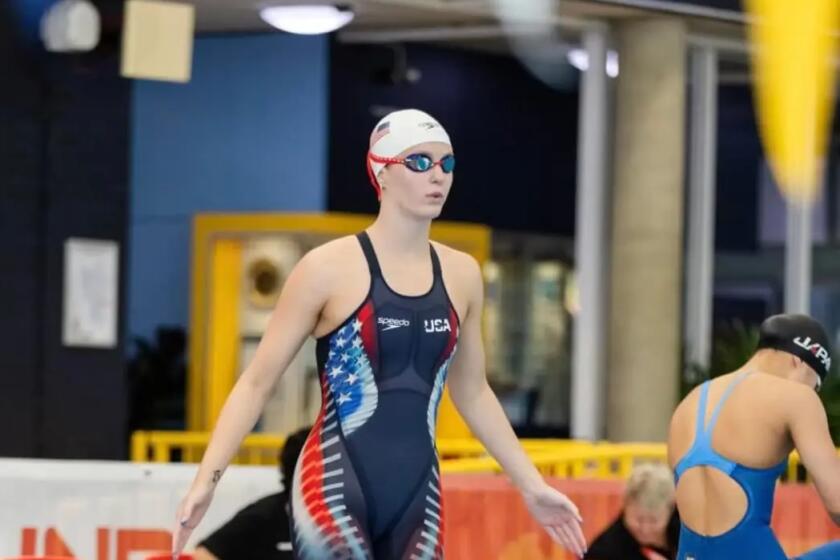A Behind-the-Scenes Look at Naked Sport : Television: The British TV crew that exposed the inner workings of the U.S. film biz with ‘Naked Hollywood’ takes a peek at another America obsession.
- Share via
LONDON — Michael Jordan didn’t really want to endorse Nikes.
“I never wore a Nike shoe until I signed with them,” the basketball mega-star and Nike pitchman says on Showtime’s “Naked Sport” (at 10 tonight). “I wasn’t as enthused to sign with them as people might have known.”
He preferred Adidas. So when Nike offered him a multimillion-dollar deal that included his own line of shoes, Jordan went to Adidas, offering to sign with them if they would match the deal. They didn’t.
“Didn’t even come close,” Jordan recalls. “So it made my decision very easy.”
The British TV crew that laid bare the inner workings of the American movie industry two years ago with “Naked Hollywood” is back with a behind-the-scenes view of America’s $25-billion sports industry.
Like its predecessor, “Naked Sport” peels back the glamorous and surface-level aspects of its subject to reveal the personalities and business deals that control one of the country’s biggest industries. And as before, there is no narration; viewers just watch events as they unfold.
“ ‘Naked Sport’ is really an anatomy of America,” says the program’s British producer, Nicolas Kent, sitting in his London office. “Particularly an American obsession, which is sport. It’s really using sports as a window to look at American culture and society.”
The 75-minute documentary offers four portraits of power. Profiled are Jordan, who is called the “epitome of the athlete as a brand-name superstar”; suspended Cincinnati Reds owner Marge Schott; former-Dallas Cowboys coach Tom Landry; and boxing promoter Dan Duva, who is seen readying fighter Evander Holyfield for a title bout against Larry Holmes.
The Showtime program should give viewers insights on subjects they thought they knew well. But it is, in fact, a pared-down version of a critically acclaimed six-part series that ran earlier this year in Britain. U.S. viewers will get to see the entire six hours in 1994 on PBS, where it will be called “Power Plays.”
“Showtime basically specializes in event programming,” Kent explains. “The six-hour documentary series is not a format they can deal with.”
For the original series, the British production team crisscrossed the United States for a year and contrasted the stories of the major power players in sports with the tales of rising stars, has-beens, shysters and others inhabiting the periphery.
In the segment “Be Like Mike,” for example, Jordan’s career as both basketball player and corporate spokesman is examined. But interwoven with that multimillion-dollar tale is the story of Michael Hermon, a high school basketball star from the Chicago ghetto who dreams of making it to the pros.
Viewers also meet Skip Dillard, a former Chicago high school star who slipped into drugs and crime.
“For Michael Hermon,” says Kent, “Michael Jordan is his dream and Skip Dillard is his nightmare.”
The problems facing Major League Baseball are scrutinized in the segment “Home of the Brave,” which questions whether egotistical players and corporate-minded owners have diluted the spirit of the game. Besides Reds’ owner Schott, there is Chicago White Sox owner Jerry Reinsdorf, who alienated many fans when he tore down the legendary Comiskey Park to build a new stadium that has been compared to a shopping mall.
In contrast, there is Van Schley, owner of the minor league Salt Lake City Trappers, who stays involved with baseball purely for the love of the game.
Other segments look at the National Hockey League’s inability to overcome its image problems and its efforts to become as profitable and glamorous as the National Basketball Assn. and, in “The Big Pitch,” the always strange, sometimes shady world of sports agents.
The rise and fall and rise of the Dallas Cowboys is interwoven with the story of high school football in Mission, Tex., where former Cowboy coach Landry once played.
“Welcome to the Sewer,” a particularly compelling segment about the world of professional boxing, contrasts the upper echelons of the business with life at the bottom. Promoter Duva oversees an operation that brings in $50 million a year. At the other end is fledgling promoter and former-New York Post reporter Mike Marley, who, in his words, is trying to line up “breathing corpses” for his newcomer Shannon Briggs to knock out.
Kent says he got the idea for the series while filming at a Los Angeles Lakers game for “Naked Hollywood,” the six-part documentary that looked beyond the myths of filmmaking.
As he was filming the game, the producer noticed that not only were the stands filled with Hollywood types, but they all sat in their appropriate levels. The most powerful took the best seats, the least important populated the back rows.
“If an L.A. Lakers game can show this much about Hollywood,” he thought, “how much can a series on American sports show us about America?”
Although he knew little about American sports when he started the series, Kent found that being an unknowledgeable foreigner was often an advantage. “People actually explain things to you,” he says. “Because you’re a foreigner, they explain their motivation and the reason they do things.”
He also says the subject matter of the series did not present a problem for non-American viewers. “A lot of people don’t know who Michael Jordan is,” he says. “But the series isn’t really about the sports. You don’t have to understand the rules of baseball to watch the program about major and minor league baseball and understand the issues and the feelings these people have.”
Kent has concluded that the sports industry in the United States is unlike any other sports scene in the world. “There’s something kind of childlike about the allure and the power sports have on the popular imagination at every level of society,” he says.
“And it’s more of a business in the United States than it is anywhere else in the world. There’s also something very American apple pie about sports in America--the way they play the national anthem before every event. All those things add up.”
More to Read
Go beyond the scoreboard
Get the latest on L.A.'s teams in the daily Sports Report newsletter.
You may occasionally receive promotional content from the Los Angeles Times.










